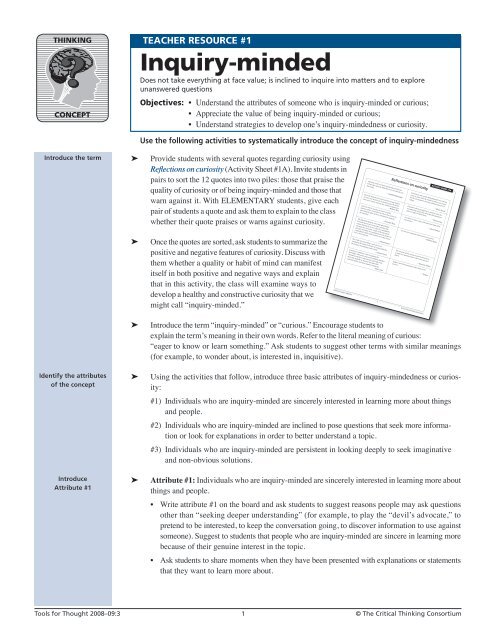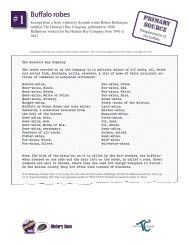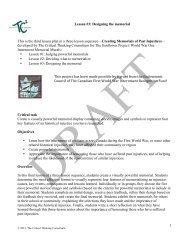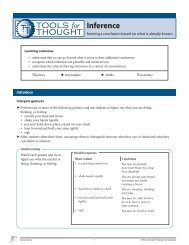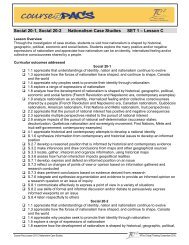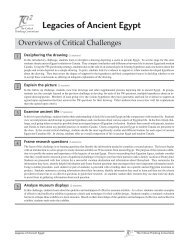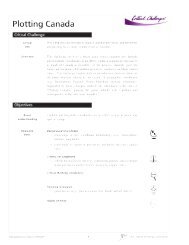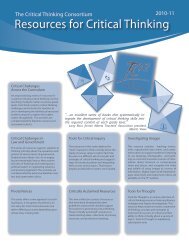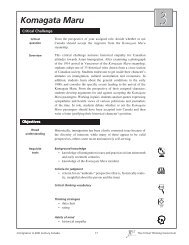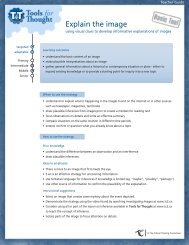Inquiry-mindedness - The Critical Thinking Consortium
Inquiry-mindedness - The Critical Thinking Consortium
Inquiry-mindedness - The Critical Thinking Consortium
You also want an ePaper? Increase the reach of your titles
YUMPU automatically turns print PDFs into web optimized ePapers that Google loves.
THINKINGCONCEPTTEACHER RESOURCE #1<strong>Inquiry</strong>-mindedDoes not take everything at face value; is inclined to inquire into matters and to exploreunanswered questionsObjectives: • Understand the attributes of someone who is inquiry-minded or curious;• Appreciate the value of being inquiry-minded or curious;• Understand strategies to develop one’s inquiry-<strong>mindedness</strong> or curiosity.Use the following activities to systematically introduce the concept of inquiry-<strong>mindedness</strong>Introduce the term➤➤Provide students with several quotes regarding curiosity usingReflections on curiosity (Activity Sheet #1A). Invite students inpairs to sort the 12 quotes into two piles: those that praise thequality of curiosity or of being inquiry-minded and those thatwarn against it. With ELEMENTARY students, give eachpair of students a quote and ask them to explain to the classwhether their quote praises or warns against curiosity.Reflections on curiosityACTIVITY SHEET #1A➤➤Once the quotes are sorted, ask students to summarize thepositive and negative features of curiosity. Discuss withthem whether a quality or habit of mind can manifestitself in both positive and negative ways and explainthat in this activity, the class will examine ways todevelop a healthy and constructive curiosity that wemight call “inquiry-minded.”Tools for Thought 2008-09:3 5 © <strong>The</strong> <strong>Critical</strong> <strong>Thinking</strong> <strong>Consortium</strong>Identify the attributesof the concept➤➤➤➤Introduce the term “inquiry-minded” or “curious.” Encourage students toexplain the term’s meaning in their own words. Refer to the literal meaning of curious:“eager to know or learn something.” Ask students to suggest other terms with similar meanings(for example, to wonder about, is interested in, inquisitive).Using the activities that follow, introduce three basic attributes of inquiry-<strong>mindedness</strong> or curiosity:#1) Individuals who are inquiry-minded are sincerely interested in learning more about thingsand people.#2) Individuals who are inquiry-minded are inclined to pose questions that seek more informationor look for explanations in order to better understand a topic.#3) Individuals who are inquiry-minded are persistent in looking deeply to seek imaginativeand non-obvious solutions.IntroduceAttribute #1➤ ➤ Attribute #1: Individuals who are inquiry-minded are sincerely interested in learning more aboutthings and people.• Write attribute #1 on the board and ask students to suggest reasons people may ask questionsother than “seeking deeper understanding” (for example, to play the “devil’s advocate,” topretend to be interested, to keep the conversation going, to discover information to use againstsomeone). Suggest to students that people who are inquiry-minded are sincere in learning morebecause of their genuine interest in the topic.• Ask students to share moments when they have been presented with explanations or statementsthat they want to learn more about.Tools for Thought 2008–09:3 1 © <strong>The</strong> <strong>Critical</strong> <strong>Thinking</strong> <strong>Consortium</strong>


